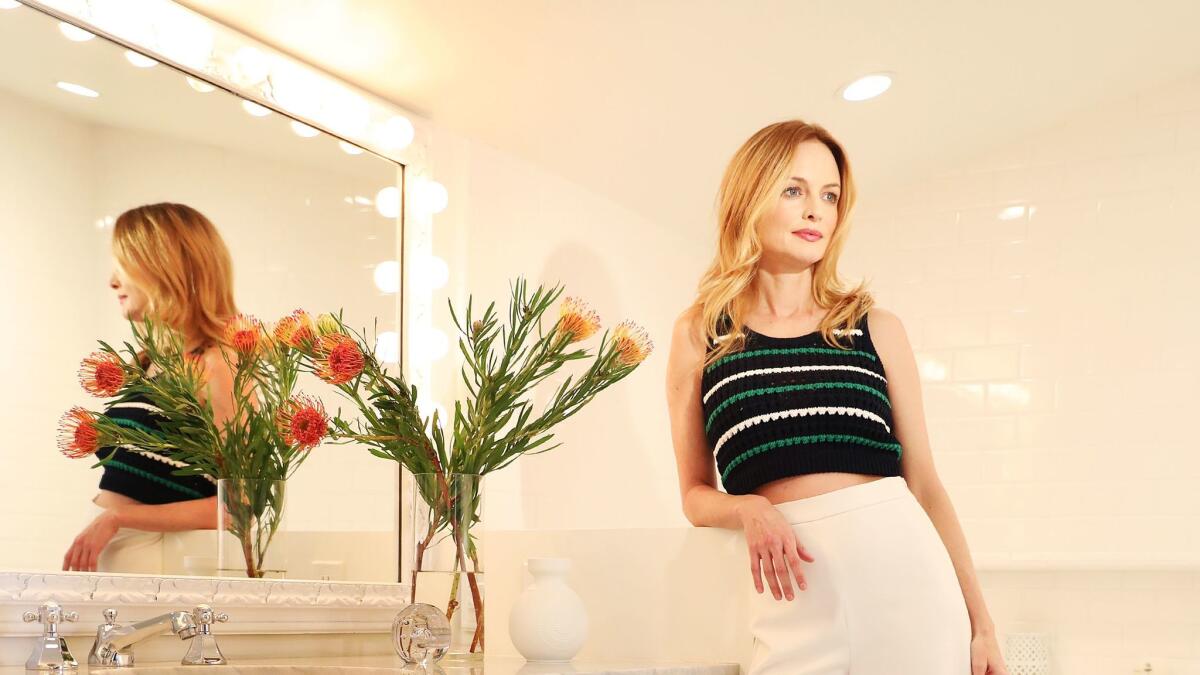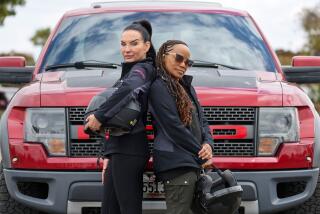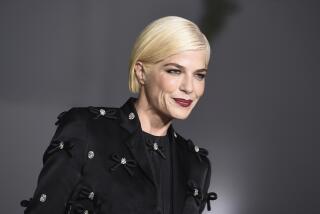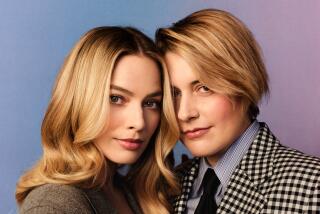Heather Graham takes on sexism in film and relationships with her directorial debut ‘Half Magic’

Actress Heather Graham’s directorial debut “Half Magic” almost didn’t happen. About a year ago the film, originally imagined in New York, was forced to shut down suddenly after financing fell through.
“We had already cast the movie, we had hired the crew,” Graham recalled. “It was really traumatic. And I had to give the rights back, which was really stressful.”
Luckily for her, producer Bill Sheinberg agreed to pick it up — just as long as it was shot in Los Angeles.
“In my mind, I saw it in New York or L.A. because I live in both places and I love them both,” said Graham. “My character does work in the movie business, so the L.A. story makes sense.”
“It’s great because the fact that we got postponed actually helped us,” she added. “I think now the movie’s coming out at a better time where people are more receptive to a story about women.”
A semiautobiographical story about bad relationships, good friendships and female empowerment, “Half Magic” pulls directly from experiences Graham has had over the course of more than 30 years in the industry.
“I would take things that people said to me and put them in the script and try to make them funny,” she said. “Like when Chris D’Elia’s character says, ‘No one cares about women’s stories. If you want to get a movie made, write about a man,’ that’s something that people had said to me.”
With “Half Magic” currently available on VOD and in a limited theatrical release, Graham talked to The Times about the challenges faced by women in Hollywood, the pitfalls of modern dating and overcoming sexual shame.
What inspired you to tell this story?
I was going through a breakup, and I was thinking, “How do I turn [my depression] about relationships into comedy?” And so I wrote down different things that had happened to me, and I tried to make myself laugh with the stupid things that I had done or that my friends had done.
Also, I was frustrated because for about eight years I worked on developing projects for women in Hollywood. I put so much time and work into it and [yet] I didn’t get them made. So I wanted to find the humor in my frustration.
Why is dating so awful? Does it get better?
[Laughs] I think because sometimes we’re drawn to the things that we hate. Like maybe dynamics in our family that didn’t feel that good, we re-create them with our relationships. I think it does get better because you get a bit more wisdom, but it’s sort of the luck of the draw. But I did want to explore in my movie why we make these bad decisions and choose these people where there’s obvious red flags. I feel like I’ve painted red flags green.
What was it like growing up in a religious household?
I used to watch “Love Boat,” and my dad would sit next to me and be like, “These people are doing something very wrong. They’re having premarital sex, and you can go to hell for that.” I just remember as a kid it seemed really frightening like, “What’s he talking about? What’s hell? What’s sex? I don’t understand any of it!”
How did you overcome that kind of shame to have a healthy sex life?
I didn’t intellectually believe what they were saying, but on a subconscious level I did have those feelings of shame. And then I fell in love with this guy who turned out to be a drug addict, but we had amazing sex. And in the moments when we were having sex, I felt like I had the universe talk to me; I felt like there was a starry sky and the voice of my higher power was saying, “Sex is beautiful, feel good about yourself and love yourself.” So then I associated that feeling with that guy. I just thought, “This means that I need to be with this guy, this guy is the key to my happiness” instead of just thinking, “I had an epiphany, this is just me.”
Do you think Hollywood has evolved much in its portrayal of women or willingness to tell women’s stories?
I don’t think it’s massively changed, to be honest. Every year there’s like three great things for women: There’s Jennifer Lawrence in “Hunger Games” or there’s “Girls Trip” or there’s “Shape of Water” with an amazing female protagonist. But most movies have male protagonists and [involve] mainly men.
Do you think it’s a matter of not believing women’s stories will sell or something else?
I think it’s sexism. I think sometimes people are so used to sexism that they don’t even notice it’s there. Like even with this Harvey Weinstein story, it kind of blew my mind that justice was actually served. I never thought I’d see the day where they’d say, “This guy should not be allowed to work in Hollywood.” It seems now that people are open to thinking about things differently and thinking that, “OK, maybe we shouldn’t let a sexual predator run one of the biggest studios in Hollywood.”
You’ve been vocal about your experience with Weinstein. Have you had many instances of sexual impropriety over the course of your career?
Yes. [But] that being said, there’s a lot of nice people too; it’s not like everyone’s a jerk. But I’ve had a lot of experiences.
What’s your response to the Time’s Up and #MeToo movements?
I think it’s amazing that women are supporting each other. I think that in the past, sometimes women would be competitive, but now I feel like women have each other’s backs. And they’re like, “This is a sisterhood, we’re all a team, we’re 50% of the population and we need to stand up for each other.”
You’ve been acting for over 30 years. How has the industry changed since you were a child actor?
Well, I worked on “License to Drive” with Corey Feldman, and he just came [forward] and said that he was being molested during that time. That’s so disturbing. During that time, nobody would’ve talked about that, people wouldn’t feel confident enough to tell the story. I think now people are like, “Let’s just be honest, let’s just be open.” There’s not that sense of shame about things. Which is kind of what my movie is about too. It’s about having a sense of shame about your sexuality and how do you get over that. And I think that’s what’s happening right now in our culture because people are going, “You know, these things happened to me, and I think the person that did them to me is screwed up. I don’t feel that it’s my fault.” That’s a massive cultural shift.
What’s your advice for young actors coming up in this industry?
For women, it’s cool to write your own stuff. I think it’s great for women to feel like they can create their own work and don’t have to just try to get a man to hire them. I know when I was younger I used to dream about, “I’ve got to get this successful male director to hire me and then I can express my creativity and then I can fulfill my dream,” and then at a certain point I just thought, “Well, it’s not really happening so maybe I should just express my own creativity and tell my story myself.”
follow me on twitter @sonaiyak
More to Read
Only good movies
Get the Indie Focus newsletter, Mark Olsen's weekly guide to the world of cinema.
You may occasionally receive promotional content from the Los Angeles Times.







